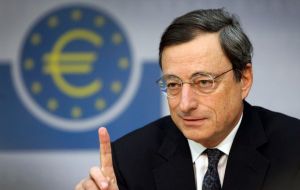MercoPress. South Atlantic News Agency
Euro zone rate left unchanged; all eyes set on how to save Greece from default
 Deagui; “economic outlook remains subject to high uncertainty and downside risks”
Deagui; “economic outlook remains subject to high uncertainty and downside risks” The European Central Bank kept interest rates on hold on Thursday and altered its assessment of risks to the economic outlook as investors focus on the ECB possible role in helping Greece avoid default.
“The economic outlook remains subject to high uncertainty and downside risks,” ECB President Mario Dragui said at a press conference in Frankfurt after policy makers left the benchmark interest rate at a record low of 1%.
At stake is whether Greece can complete a private sector deal to reduce its debt by as much as 100 billion Euros and secure a second bailout package that will allow it to pay its bills, key steps toward ending the debt crisis.
The Greek government has reached agreement with political parties on austerity measures required for the 130 billion-Euro bailout package and an announcement from Prime Minister Lucas Papademos office was made late Thursday.
Draghi has been instrumental in easing the turmoil in his first 100 days in office, offering banks unlimited three-year loans and reversing the two rate hikes implemented by his predecessor, Jean Claude Trichet.
Premier Lucas Papademos struggled for weeks to unite political parties on the austerity measures needed to secure a second bailout from Euro-area governments, while a deal to write off 70% of the value of bonds held by private investors remains to be finalized.
The ECB has purchased 219 billion Euros of debt-strapped nations’ bonds since May 2010. Between 36 billion Euros and 55 billion Euros are invested in Greek sovereign debt, according to estimates by Barclays Capital and UBS AG.
The ECB is considering selling those bonds to the European Financial Stability Facility at the knock-down price it paid for them, forgoing any profit, two Euro-area officials said late last week. The EFSF could then pass that saving on to Greece or even take a loss on the bonds, helping to alleviate the nation’s debt load without compromising the ECB independence. There are still hurdles to that option, the officials said.
Another course is for Euro-area central banks to give up profits or take losses on Greek bonds in their separate investment portfolios, which are not part of monetary policy operations.
So far, Draghi hasn’t signalled any ECB involvement in a Greek restructuring. Instead, the ECB has focused on warding off a looming credit crunch and encouraging lenders to re-enter sovereign debt markets.
On Dec. 21, it allotted a record 489 billion euros in three-year loans to banks, the first of two such operations. In the run-up to the second offering on Feb. 28, the central bank is finalizing a further broadening of the pool of collateral banks can use to obtain the cash.
European leaders have taken up Draghi’s idea of a “fiscal compact,” agreeing to a treaty that will speed sanctions on high-deficit states and require euro countries to anchor balanced-budget rules in national law.




Top Comments
Disclaimer & comment rules-

Read all commentstheir wasting billions and billion of other peoples money, just to keep there stupid euro alive,, and who will pick up the bill,
Feb 09th, 2012 - 11:50 pm 0Commenting for this story is now closed.
If you have a Facebook account, become a fan and comment on our Facebook Page!